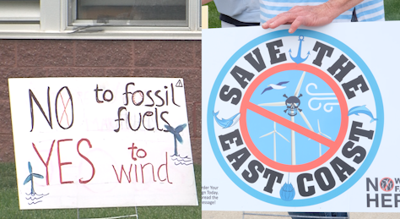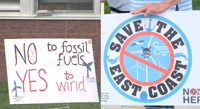LEWES - Offshore wind energy was the focal point of a public information session hosted by the Delaware Department of Natural Resources and Environmental Control (DNREC) at Beacon Middle School in Lewes. The session addressed land permits required for running transmission cables from offshore wind turbines under 3Rs Beach to an area near the Indian River Power Plant.
The meeting saw a familiar scene of demonstrators both supporting and opposing the offshore wind project. The session aimed to provide clarity on the permit process necessary for US Wind to proceed with its plans.
DNREC spokesperson Nikki Lavoie emphasized the importance of transparency in the process.
“Our subject experts are going to be looking at the permit applications and reviewing them according to state laws and regulations,” she explained. “It is an opportunity for the public to come out and ask them questions about the permits, the application process, and what it means.”
US Wind will need DNREC approval for several permits, including a Subaqueous Lands Permit, a Wetlands Permit, a Water Quality Certification, and a Beach Preservation Coastal Construction Permit.
Advocates for offshore wind expressed optimism about the potential benefits of the project and stressed the importance of public support.
"When folks talk to legislators or attend hearings like this, it’s really important to let them know there is support for offshore wind in Delaware.” said Dustin Thompson who came representing Sierra Club Delaware.
“I have two great grandchildren, and if we don’t protect our resources, protect our climate, their won’t be much of a quality of life for these folks coming up.” said Peggy Schultz with People for Offshore Wind Energy Resources (POWER).
However, opponents voiced significant environmental concerns. Lewes Waterman Sean Patrick Moore said he's worried how it will affect marine life,
“We have the horseshoe crab sanctuary right here off Delaware, stretching from Cape May down to Fenwick Island,” he noted. “If we lose them, we’re going to lose the shorebirds like the red knots—it will affect all kinds of life."
David Stevenson of The Ceaser Rodney Institute, who has been a vocal critic, said he hopes they deny the permits, but is glad to see debate,
“This is Maryland’s project. Let them deal with it. Why are they messing up our beaches and inland bays? It just shouldn’t be here," he said.
DNREC will hold a public hearing on July 9th regarding the permitting process and will accept online public feedback until September 9th.



